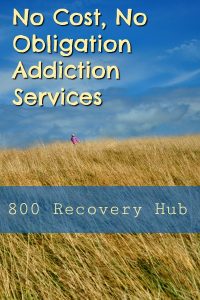Our Origin Started in Placing People In Treatment
Over four years ago 800 Recovery Hub started offering (for you or your loved) one a variety of no obligation, no cost and always confidential services with the goal of getting you the best care available.
We did this for any addiction no matter what your financial situation was. Beginning with a friendly ear to listen to your situation at 800 Recovery Hub we got you the intervention help, addiction assessment, insurance evaluation, scholarships, financial aid and treatment center evaluation, and placement.
800 Recovery Hub was founded by two people in recovery with over 50 years combined experience in addiction recovery
Our goal was (and still is) helping others in need. We know there is no single Hospital Program or Treatment Center Group that is the right option for everyone. Who could possibly help the estimated 30 million people suffering from Addictions, Disorders, and Trauma in the U.S? It’s just not possible one size can’t fit all.

We started this mission because there are many factors that go into deciding which is the best recovery option or treatment facility for you or your loved one. Things like various addiction specializations, detoxification methods, location, the length of programs, aftercare, in-patient, out-patient, facilities, special needs, coed, age, gender, religious beliefs, cost, insurance etc.
That is precisely why we started 800 Recovery Hub to be the connection between you and the thousands of recovery home choices and offer placement assistance.
Treatment Center Marketing
We have shifted our focus to working with treatment centers and rehabs directly. Our mission is ever evolving. However, we will share with you an interview we did several years ago. Hopefully, once you get to know us, you will appreciate our dedication.
From Victoria
I am the clinical director of 800 Recovery Hub. My husband Bruce and I started 800 Recovery Hub because we know firsthand how hard it is to find a treatment center for a loved one. The problem is that treatment centers don’t look at a case as objectively as we do.
For example, if a person comes to a clinic with a co-addiction like alcoholism and bipolar disorder, but that rehab facility specializes in a different addiction, then (even if that clinic wants to provide help) that may not be the ideal place for the patient’s care. Also, there have been a lot of changes in the healthcare laws since the Affordable Care Act was passed and it is unreasonable to expect people to understand what their insurance will cover. We can help with that.
Have you had any experience with addiction yourself?
Yes, I drank abnormally the first time I tried alcohol. By the time I was 25, I was drinking all day, every day. It got very bad at the end and I hit bottom 21 years ago at age 26.
What information should someone have available before calling to find help?
Any insurance information they have, their full name, address, and a list of substances they use. They can call us at our 800 number use our chat service or fill out a quick form and we will call them after receiving it. We are also very active and able to communicate through social media.
What questions should a person ask themselves before calling to seek help?
We talk to people in various stages of addiction. Sometimes they are court-ordered to enroll in treatment and in other cases they are desperate to save their life. The thing I find most interesting is that a person doesn’t have to want help to get better. We get patients that simply don’t want to get sober, but are going to rehab to save their job or marriage.
My assumption has always been that they will relapse after the program ends. However, this is not always true. Once people start feeling better, they like the way they feel, and when we like the way we feel, we want more of that feeling. I guess that is why many of us start using drugs and alcohol in the first place.
Will your representatives be able to help guide a person toward the right treatment option?

Yes, that is what we specialize in. We are also very good at helping people obtain the right insurance policy if they don’t already have one.
What if the person does NOT have insurance? Is any help available?
If you live in the United States, you must have insurance by law. Having said that, we get a lot of requests for help from uninsured people, and we are able to provide them with options. No one is going away empty-handed.
What method of treatment is most commonly sought by alcoholics?
This has changed a lot over the years. The 12-steps of Alcoholics Anonymous used to be the model for most treatment centers. Now there are a lot of different options for alcoholism and alcohol abuse. The most common is a combination approach — a mix of therapy, group counseling, medication (short and long-term), and traditional 12-step support.
If a person gets a recommendation for a treatment program, do they HAVE to seek that treatment?
No, they can’t be forced to go. Once we had a person flee while on the way to the treatment center. His dad stopped for gas, and the guy just ran. Many times, they end up calling us back.
Will people be forced into any kind of treatment?
Sometimes treatment is court ordered or mandated by an employer. But, the person can still leave. Rehab centers are not set up like prisons.
What would you say to someone who is nervous about starting the process of finding help?
Jump in because you have nothing to lose. Right now, the Affordable Care Act mandates that insurance companies cover drug and alcohol treatment. That could easily end. Take the opportunity while it is there. There is a saying that, “We will gladly give you back your miserable life if you don’t like the treatment.”
Why SHOULD someone call to start looking for help?
People don’t think about calling a treatment center by accident. If someone is questioning their drug or alcohol use, they have a problem. Normal people don’t ponder this concept.
SaveSave
SaveSave
SaveSave
I did not know where to go when I needed help for my drug and alcohol problems. I had medical insurance but it was too confusing to figure out if addiction treatment was covered. Feeling all alone, I decided to quit on my own, and I almost died. I don’t want anyone to go through what I did. That is why we created 800 Recovery Hub.
SaveSave
SaveSave
SaveSave
SaveSave
SaveSave
